0 Volumes
No volumes are associated with this topic
Tammany Hall Origins
Is our court system getting better from the top down, or worse from the bottom up?
Tammany: Philadelphia's Gift to New York
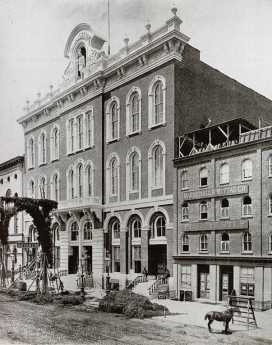
|
| Tammany Hall |
EDWARD Hicks painted a scene over and over, depicting William Penn signing a treaty of peace with the Lenape Indians at Shackamaxon ( a little Delaware waterfront park at Beach Street and E. Columbia Ave.). This scene was apparently a reference to a larger and more finished depiction by Benjamin West. The Indian chief in the painting is Tamarind, chief of the Delaware tribe. Long before Hicks got the idea for the picture from Benjamin West, Tamarind was locally famous for having the annual celebrations of the Sons of St. Tammany named after him. These outings centered on the joys of local firewater and thus may have had something to do with the evolutions of the Mummers Parade. George Washington presided over a lively Tammany party at Valley Forge, and local Tammany Hall clubs sprang up all over the country. The most famous offshoot had its headquarters on 14th Street in New York, as a club within the local Democrat party asserting Irish dominance over New York politics, allegedly using Catholic Church connections to control other immigrant groups. The identity of Tammerend seems to have got thoroughly mixed up along the way; the famous statue of "Tecumseh" at the Naval Academy in Annapolis, much revered by the cadets, is actually a depiction of Tammany.
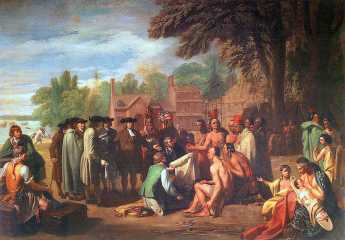
|
| Penn's Treaty With the Indians By Benjamin West |
At earlier times, Tammany was the vehicle Aaron Burr used to assert control of the now-Democrat Party, particularly in the contested Presidential election of 1804. Shooting Alexander Hamilton in a duel, along with disgrace and impeachment as Vice President necessitated Burr's rapid conversion into a non-person, both in New York and in Philadelphia. In Philadelphia, the uproar led to the dispersion of Tammany influence, while in New York other bosses, particularly Boss Tweed, took over the organization and consolidated its role as a small club which dominated a larger political party, which in turn pretty well took over the government of New York City, which in turn dominated the governance of New York State, and even occasionally leveraged itself into national politics. Eventually, Tammany fragmented sufficiently that Mayor Fiorello La Guardia was able to dislodge it from control, which in time led to its dissolution. In a larger sense, however, the decline of New York's Tammany Hall began when in the late 19th Century it adopted the Philadelphia system of consolidating graft from local leaders into unified "donations" from local utilities. That greatly improved the efficiency of collections and disbursements but undermined the need for an effective local organization of ward leaders.
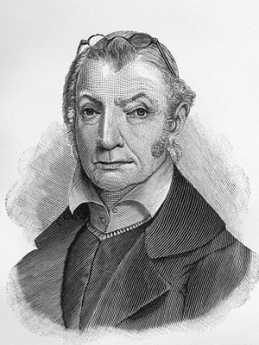
|
| Aaron Burr |
So, although Tammany was originally a Philadelphia creation perfected by New York, it continued to have connections to Aaron Burr in early days, and Philadelphia machine politics later on. But of course for seventy-five years, around here it seemed Republican.
State in Schuylkill Fishing Club
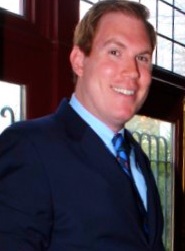
|
| Richard Romm |
Richard Romm, a rising historical scholar with a special interest in early Philadelphia, recently educated the Right Angle Club in the history of the Schuylkill Fishing Club in the State in Schuylkill, and was immediately accepted into membership. Of the Right Angle, that is, which is an old club by some standards, but scarcely a hundred years old in the eyes of the really old, old clubs.
The State in Schuylkill is an eating club, originally a fishing and eating club, apparently organized around the annual shad run up the river. The clubhouse, or Castle, was moved several times, in response to damming of the river, and is now located on the grounds of, or adjoining the edge of, Nicholas Biddle's estate on the Delaware River called Andalusia. One by one, the Atlantic Ocean rivers of America have been dammed and their annual shad migrations brought to an end, except through the city of Richmond, Va, so there was little point in moving The Castle to follow the fish. It remains, overlooking Delaware in spite of its name.
There seems to have been several name changes, the most important of which was to change the Colony of Schuylkill to the State of Schuylkill for obvious reasons. Originally, the Castle was roughly opposite the falls of Fairmount on the West Bank of the Schuylkill at about Girard Avenue; thus, from 1732 to 1822 located on Baron Warner's property called Eaglesfield. In 1822 it moved to Rambo's Rock (the Rambo family is said to be the oldest European settler family in Pennsylvania) opposite Bartram's Gardens, then finally in 1887 to Andalusia, Nicholas Biddle's country estate. The club was founded in 1732, and dates of movings are possibly hazy, possibly somewhat because of the reluctance of club officers to return the calls of inquiring historians. The State in Schuylkill claims to be the oldest organized men's club in the world, an honor contested by White's in London. The roots of this argument are found tangled in the vital issue of whether their age should be based on the formal organization of the clubs, or on the establishment of the coffee houses which housed the original clubs. Four books are said to have been written about club history, but we depend here on Mr. Romm.
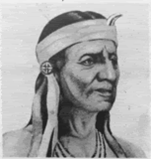
|
| Chief Tammenend |
There is also an unclear relationship with Chief Tammenend, possibly traceable to the shad run, but in any event to the Indian chief depicted with William Penn in the paintings by Benjamin West and Edward Hicks. May 1 is St. Tammany's day, growing into the fancy that he was the "Patron Saint of America", before a branch of the nation-wide Tammany association opened in New York and sort of tarnished up the name. Other traditions of the Fishing club have to do with wearing Mandarin hats, possibly having to do with the export of ginseng which was once abundant in our colonial suburbs, with a return cargo of Chinese dishware. All of the cooking is done by official citizens of the club. The quantities of food are remarkable; one 19th Century menu listed eleven pounds of meat per member. The club drink is a punch, the famous Fishhouse Punch, widely recognized to be rather strong. Its inventor is reputed to be Edward Shippen Willing, on the occasion of the first visit to the clubhouse by women guests. The quantity of alcoholic beverage at these events is especially remarkable in view of the Quaker origins of many original members of the club, but not necessarily of the guests. Among the various guests were Generals Grant, Meade, and McClellan. Dinner begins with two traditional toasts: to George Washington, and to Captain Sam Morris. Washington was appropriate enough, having a history of drinking a bottle of Madeira every day at lunch. But Sam? Captain Sam the Quaker?
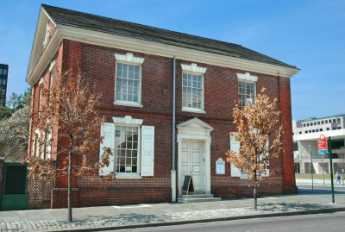
|
| Free Quaker Meetinghouse, Fifth and Arch Streets |
Somewhere in this tradition are allusions to the Free Quakers, Quakers who abandoned the peace testimony to fight the British. There is also the tradition of hostility to British rule which antedates the Revolution and may have some connection to the fanciful contention that their little state was not really part of Penn's colony. Captain (of the City Troop) Sam was a stalwart, possibly the sole founder, of the Gloucester (N.J.) Fox-hunting club. The history is passed down that 22 of the original 26 members of the First City Troop were members of the fox-hunting club, and many if not most were Quakers. The first "Governor" of the State in Schuylkill was Thomas Stretch, but the second Governor, from 1766 until his death, was Captain Sam. He was repeatedly referred to as the life of the club and held in the highest esteem by all. He was "read out" of the main Quaker Meeting, not so much for his drinking as for his flouting of Quaker belief in pacifism. He reputedly led a saber charge at the Battle of Trenton and was a leader of the City Troop in that revolution within a revolution at James Wilson's house, which rescued at least four future signers of the Constitution from a mob of militia which momentarily turned Jacobin.
Naturally, descendants of Quakers on both side of this uproar have been reluctant to say much about it. But somewhere within the history of Samuel Morris must be some important clues about the 18th Century splits within the Quaker Church, to say nothing of the revolt of the three Quaker colonies against British rule.
College for Prison Inmates

|
| Marjorie G. Jones |
The Right Angle Club was honored to have the wife of one of its members, Marjorie G. Jones wife of Jonathan Jones, as its speaker at a recent Friday lunch meeting. Both are Quakers, as you might expect from couples with those names. Marjorie told us of her interesting experiences with a typical Quaker concern, supplying college education to incarcerated prisoners.

|
| Graterford Prison |
In this case, she was not acting as a J.D., which she also is, but rather as a teacher, teaching college-level History at Graterford Prison to sure-enough felons, under the auspices of Villanova University, and before that, at Sing-Sing Prison. Pennsylvania comes out looking rather shabby by comparison with New York in these matters, an example of which is the Pennsylvania Law that no one may teach Social Science except with a Ph.D. degree, even though they have a J.D. as she does. Similarly, there are four thousand prisoners in Graterford, while the much more famous Sing-Sing has only seventeen hundred. Pennsylvania hates to blow its own horn, even when the subject is fairly non-glamorous. It even goes as far as spell-check, which never heard of Graterford, but has no trouble recognizing Sing-Sing, up alongside the Hudson River, in Ossining, NY -- which is only half as large.
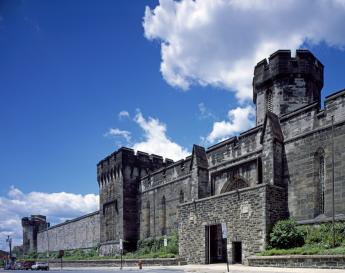
|
| Eastern Penitentiary |
The Quakers of Pennsylvania conceived of Eastern Penitentiary, whose central theme was solitary confinement, hoping in the Quaker tradition for the calming effect of silence to soothe the prisoner into remorseful rehabilitation. Most Quakers would not see quiet reflection as a punishment, but the rest of the world under the leadership of Charles Dickens no less saw it as hideous torment, cruel and unusual punishment. Most Quakers will tell you they rather enjoy an hour of silence.
Ever since their own imprisonment in the 17th Century, the Quakers have had a particular interest in helping the plight of the incarcerated. The rest of the world may yet turn away from prison as a punishment, because prisons are so expensive, costing more than it costs to go to Harvard, and having an incidence of recidivism close to 65%, plus nearly universal drug use. The Quakers, seeing That of God in every man, specialize in giving college degrees to inmates, and have a recidivism rate of around 1%. Mrs. Jones frankly admits there are some people in stir who deserve to be there and would be a hazard to society if released. Pennsylvania has little sympathy with "visitation" rights, which are greatly enjoyed by New York prisoners, while Pennsylvania is more attracted to privately operated prisons, with their incentive for welcoming more prisoners the better.
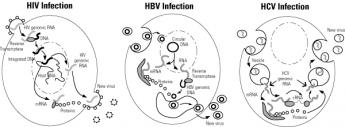
|
| HIV (AIDS) and Hepatitis B, Hep C |
A week ago, a new development clouded the issue of what should be done about the punishment of crime. For twenty years, we have had a cheap simple test to demonstrate the existence of Hepatitis C, but no acceptable treatment. Like HIV (AIDS) and Hepatitis B, Hep C seems to have got its start in homosexual males, and gradually spread into the rest of the community by "dirty needles" in the intravenous drug world. The first two are coming under control with new drugs and vaccines, but Hep C just festers on, and eventually kills the victim with cirrhosis. But last week, the whole matter changed with the announcement of twenty new drugs with more than 95% cure rate in three months, and unfortunately a $65,000 price tag per patient. That's about $150 billion for the known cases clustered around penniless American prisoners, to say nothing of what might immigrate from abroad. There are about 30 million American residents intentionally excluded from those federal programs Congress is now wrangling about, including several million incarcerated prisoners. If even the Obama administration didn't know what to do with prisoners' health costs, it isn't easy to see a federal solution to it, and since the states are overwhelmed by health costs already, they won't likely be eager to add to them, either.
Because we had a test for Hepatitis C for twenty years before we had an effective treatment for it, patient identity is pretty well classified. It will become glaringly evident that the people who don't have the disease will be forced to pay for those who do, and those who do will already have all of the common characteristics for being discriminated against -- black, male, convicted homosexual criminals, to which must now be added the accusation of spreading disease. The prisoners are mostly destitute, and Hepatitis C is contagious to the rest of the population.
On the other hand, it is simply unthinkable to turn these patients loose untreated, no matter what other foreign nations may be bold enough to try. The "solution" is apt to revolve around forcing the drug companies to lower prices as a punishment for curing a disease, and the rest of the population to suffer more taxes. Unfortunately, this is apt to concentrate public ire on criminal violators, homosexuals, drug addicts, immigrants, and black people. It is also apt to stimulate a desire to eliminate prisons by constraining their budgets even further below humane standards. You can expect Congressional hearings about the failure of competition to lower prices, and indeed it really is unlikely that twenty drugs would spontaneously make an appearance overnight, achieving a 95% cure rate, all at the same time. More likely, the manufacturers hoped to recover their investments, before the disease disappeared. But somebody is likely to get flogged, perhaps ejecting prisoners from jail back toward the whipping post, perhaps by looking for deeper pockets within the pharmaceutical industry.
Corrupt and Contented
In 1904, first in McClure's Magazine and then in the book Shame of the Cities, Lincoln Steffens described the root cause of Philadelphia's bad local politics as failure of the people to turn out to vote.
The Philadelphia machine isn't the best. It isn't sound, and I doubt if it would stand in New York or Chicago. The enduring strength of the typical American political machines is that it is a natural growth -- a sucker, but deep-rooted in the people. The New Yorkers vote for Tammany Hall. The Philadelphians do not vote; they are disfranchised, and their disfranchisement is one anchor of the foundation of the Philadelphia organization."
Just exactly a century later, a Republican member of the Legislature coined a phrase:
"You show me a hundred thousand dollars, and I'll show you a Pennsylvania judge."
Asked to comment, two Democratic politicians on the inside (although one is dead and the other is in Federal prison for embezzlement) replied:
"That isn't precisely so. The precise way of stating it is that, to be elected a judge has two basic requirements. The first is the approval of a local ward leader. The second is the expenditure of between seventy and hundred-thirty-thousand dollars. With these two requirements fulfilled, just about anyone can be elected judge, regardless of legal qualification."
Is it a mystery why we have a malpractice crisis? Other explanations are offered, but this one, the system of "elected" judges, should be examined first. It's a slightly worse system than appointing them. Someday, someone will discover why state courts are much more corrupt than federal ones. Is the court system getting worse from the bottom up? Or getting better from the top down?
4 Blogs
Tammany: Philadelphia's Gift to New York
 All the bad things they say about Tammany Hall are somewhat true. William Penn, George Washington, and Aaron Burr can be happy that Tammany Hall is now mostly a New York tradition, its Philadelphia origins long forgotten.
All the bad things they say about Tammany Hall are somewhat true. William Penn, George Washington, and Aaron Burr can be happy that Tammany Hall is now mostly a New York tradition, its Philadelphia origins long forgotten.
State in Schuylkill Fishing Club
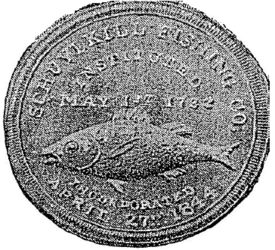 Unless you listen to some quibbles from White's in London, the Schuylkill Fishing Club of the State in Schuylkill is the oldest organized men's club in the world. And even if that exception is admitted, it's the oldest men's club in America. It's no secret, but it's very private.
Unless you listen to some quibbles from White's in London, the Schuylkill Fishing Club of the State in Schuylkill is the oldest organized men's club in the world. And even if that exception is admitted, it's the oldest men's club in America. It's no secret, but it's very private.
Corrupt and Contented
Pennsylvania elects judges, and that is slightly worse than appointing them.